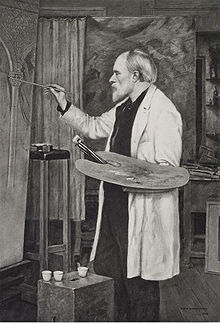Sir Edward Burne-Jones
| Sir Edward Burne-Jones, Bt | |
|---|---|

Photogravure of a portrait of Edward Burne-Jones by his son Philip Burne-Jones, 1898
|
|
| Born |
Edward Coley Burne-Jones 28 August 1833 Birmingham, England |
| Died | 17 June 1898 (aged 64) London, England |
| Movement | Pre-Raphaelite Brotherhood, Aesthetic Movement, Arts and Crafts Movement |
|
|
|
|
|
|
| All at Smarthistory |
Sir Edward Coley Burne-Jones, 1st Baronet ARA (28 August 1833 – 17 June 1898) was a British artist and designer closely associated with the later phase of the Pre-Raphaelite movement, who worked closely with William Morris on a wide range of decorative arts as a founding partner in Morris, Marshall, Faulkner & Co. Burne-Jones was closely involved in the rejuvenation of the tradition of stained glass art in Britain; his stained glass works include the windows of St. Philip's Cathedral, Birmingham, St Martin in the Bull Ring, Birmingham, Holy Trinity Church, Sloane Square, Chelsea, St Martin's Church in Brampton, Cumbria (the church designed by Philip Webb), St Michael's Church, Brighton, All Saints, Jesus Lane, Cambridge, Christ Church, Oxford and in St. Anne's Church, Brown Edge, Staffordshire Moorlands and St.Edward the Confessor church at Cheddleton Staffordshire. Burne-Jones's early paintings show the heavy inspiration of Dante Gabriel Rossetti, but by the 1860s Burne-Jones was discovering his own artistic "voice". In 1877, he was persuaded to show eight oil paintings at the Grosvenor Gallery (a new rival to the Royal Academy). These included The Beguiling of Merlin. The timing was right, and he was taken up as a herald and star of the new Aesthetic Movement.
...
Wikipedia
